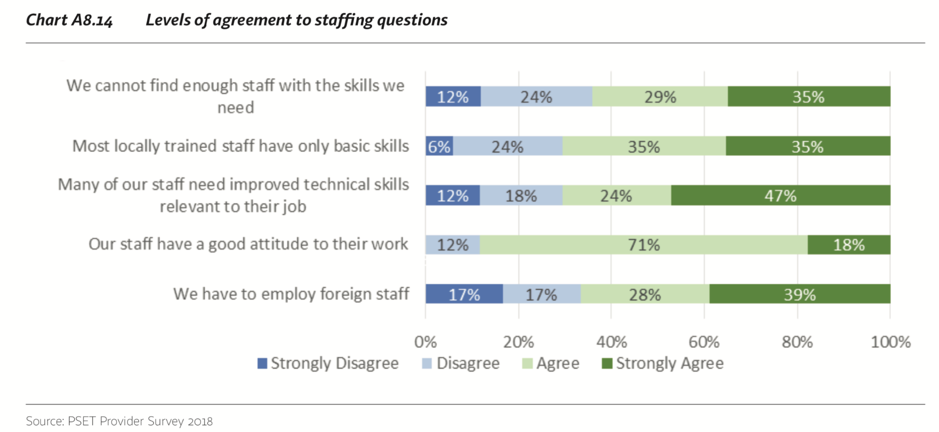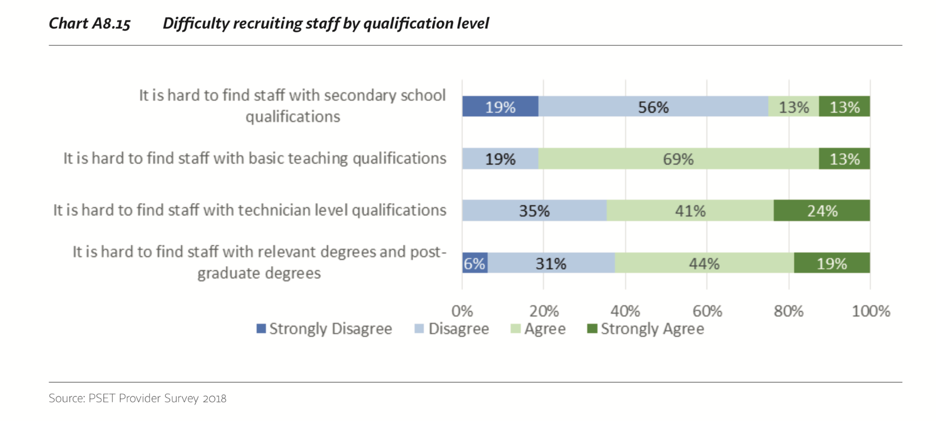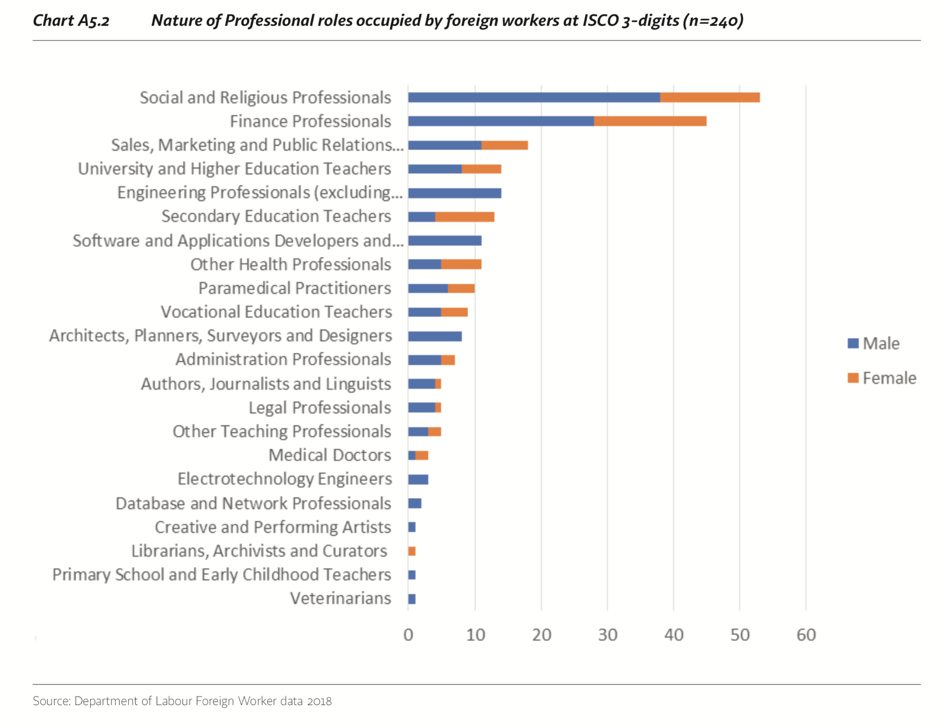Before we can discuss employment, we need to establish a few facts:
Every single business owner in Vanuatu prefers to hire locally.
Hiring someone from overseas costs more per year than a similarly skilled Ni Vanuatu. Relocation, permits, insurance, taxes and assistance are all expensive, as are inducements for the person to move to Vanuatu.
Local workers are a better deal for everyone.
Skilled Ni Vanuatu are already in high demand.
There is no shortage of employment for citizens with advanced professional skills and experience.
Job creation is a responsibility of the private sector and growth should bring an increase in number of positions available overall. The private sector, government, ministry of education, and all of society should work together to increase the number of skilled and experienced Ni Vanuatu to fill those positions.
Broadening the employment base and improving access to technical, executive and management positions is a goal we all share.
The 2018 National Human Resource Development Plan is an excellent guide. It contains data and insights that are critical to any plan. Its findings should form the basis of this country’s employment plans in the future.
Basic principles of employment and economic growth
Education = employment
Until recently, successive governments neglected education. Even as late as 2013, less than 2 out of 10 young people managed to complete high school. While governments provided scholarships for many of these graduates, they spent hundreds of millions on the fortunate few, and far less on primary and secondary school students.
That has changed recently. The current primary school population will be better prepared for advanced education and training than the last one, but that’s years away.
The Human Resource Development Plan spends much of its 140 pages discussing education opportunities for the next generation. Focusing on education to drive employability and to provide professional and technical training is the right choice.
Even before the final report came out, the government of Vanuatu had committed massive funds to improving our education system. This is the right place to focus. It will take time and immense effort, but it’s the only way to ensure that employment levels improve for the next generation.
This country needs to give its existing policies time to work. There are no quick fixes here.
Skilled Ni Vanuatu workers are already in high demand
Vanuatu citizens with professional and technical skills seldom have trouble finding a job. The people who struggle most are unskilled and semi-skilled workers.
The Human Resource Development Plan makes it clear that of the small fraction of the workforce with work permits at the time, nearly all were in areas with a shortage of skilled Ni Vanuatu workers.
The only real exception to this was for missionary workers.
The problem Vanuatu faces is not demand for workers. It’s supply.
Employers prefer to hire locally whenever they can, because it saves them money. Why would they spend months of time and millions of vatu if they could find the right person right here?
Limiting the skills pool limits growth
Employers everywhere have to work hard to find people with the right skills and experience. The Human Resource Development Plan shows that Vanuatu has lots of people with the right attitude. But we have a shortage of people with key skills.
Here is what the Human Resource Development Plan found:
· 64% of all respondents agreed that ‘we cannot find enough staff with the skills we need’.
· 70% agreed that ‘most locally trained staff have only basic skills’.
· 89% agreed that ‘our staff have a good attitude toward their work’.
· 67% agreed that ‘we have to employ foreign staff’.

Employers would hire more local staff to these roles if they could. But there just aren’t enough of them. The problem is finding staff with higher education.
· 75% of respondents disagreed that ‘it is hard to find staff with secondary school qualifications’.
· 82% agreed that ‘it is hard to find staff with basic teaching qualifications’.
· 65% agreed that ‘it is hard to find staff with technician-level qualifications’.
· 63% agreed that ‘it is hard to find staff with relevant degrees and post-graduate degrees’.

Looking at who does get hired from overseas makes that clear. Aside from NGO workers and missionaries, only finance professionals numbered more than 20 in 2018.

By any measure, the number of foreign workers is very small. We’re talking about a dozen jobs or less here or there. Employers hire overseas when they cannot fill the position locally. In many cases, this is because the role requires specific qualifications or certifications.
Employers do not hire internationally if they don’t need to. That means they can’t do without these positions.
If we impose a shortage on these few key positions, we could slow down the entire economy.
Open economies are prosperous economies
All of the world’s most successful economies—both the largest and the most prosperous—have derived a key advantage from opening their labour force to all. The UK, France, Canada, the USA, China, Australia, New Zealand, Singapore… the list is long.
Open economies are healthy economies. Just ask our thousands of Ni Vanuatu seasonal workers.
The USA and China both relied heavily on skilled worker visa programmes to establish their world-class tech industries.
The lesson is clear: Skilled worker visa programmes build economies, and restrictions slow them down.
Employment breeds more employment
In a growing economy, the number of jobs increases faster than the population. Opening the door to more skilled workers means more businesses will set up shop here. More businesses mean more jobs for everyone.
The other side is equally true: Taking a job away from someone doesn’t mean it goes to someone else. It could just as easily remove the job entirely.
In many cases, removing the job of the skilled worker will mean several other jobs disappear as well.
If you stifle even a single business, you take many jobs out of the market. Not just the employees, but the mamas who sell them food, the store keepers who sell them goods and the staff who help them shop, the bus and taxi drivers who get them to work and back, and the people they employ when they save and build a home.
This can create a negative multiplying effect, a vicious circle of lost opportunities that can slow or even stop growth.
If we want to create more opportunities for Ni Vanuatu, we should create more opportunities for everyone.
Markets drive economies
Everyone needs rules. Fairness, openness and honesty are necessary for a market economy to function.
But that doesn’t mean that more rules make a better economy. Freedom is just as important. Companies, investors and workers all need to be free to make their own decisions. Putting too many restrictions on businesses is just like squeezing a balloon. Businesses move away from where the pressure is greatest, and set up where it isn’t.
In order for markets to work, governments need to understand and accept that the private sector can grow and develop on its own. And when companies prosper, they gladly contribute taxes, wages and wealth to the society that gives them a home.
Recommendations
It is incumbent on businesses to show that they’re acting in line with market forces and for the common good. We support reasonable oversight in this area.
Some of the fields on the proposed reserved list (auditor, accountant, project manager) are required to have professional qualifications. No such qualifications exist in Vanuatu and our preferred default is usually ANZ or Fiji standards. This presents a challenge. Currently only small numbers of Ni Vanuatu with such qualifications exist. There is a risk of these positions remaining unfilled.
Positions requiring professional certification should not be included in the reserved list, as the adverse effect on the economy would be too great.
Positions up to VT 400,000 per month in salary: Reasonable efforts must be taken to locate and recruit Vanuatu citizens before a non-resident can be hired.
Professional/executive positions paying over VT 400,000 per month should be open to competition, but subject to the same Immigration and ‘fit and proper person’ requirements as already exist.
I fear that the value of competition is being overlooked. Competition and the right to trade freely are the core of every market economy. We should all applaud every effort that helps Ni Vanuatu compete more effectively, and grown in success.
But the proposed measures would shrink the employment market, not grow it. They would achieve the opposite of what they intend.
